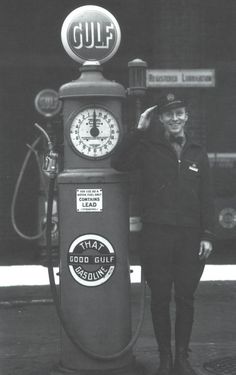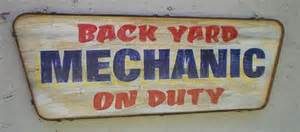Back in the day when gas stations were “service” stations, when the attendants wore uniforms tricked out with caps and bow ties ambling out of their small office areas, which sold everything from auto parts to cigarettes and beverages to cholesterol-clogging snacks, usually wearing a smile, and if the driver were a patron, offering a congenial greeting to the Mr. or Mrs., you were confident that you and your automobile was in good hands. If the attendant was above average, he might even remember the names of the patron’s kids. After inserting 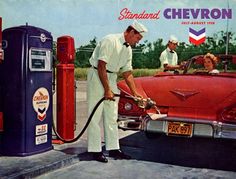 the nozzle into the tank and turning on the gas flow the pleasant attendant would ask, “Check that oil for you, Mr. Arnold?” Like the “Greatest Generation,” soon there will be no one left alive who will remember having been asked that question.
the nozzle into the tank and turning on the gas flow the pleasant attendant would ask, “Check that oil for you, Mr. Arnold?” Like the “Greatest Generation,” soon there will be no one left alive who will remember having been asked that question.
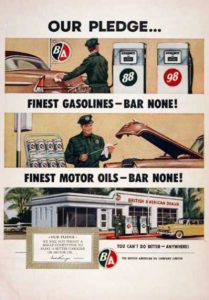 And while the whoosh of gas flowed through the pump and into the tank of your car (I loved the smell of gas fumes escaping into the atmosphere, which might explain my cognitive issues), the wipers were looked over, the tire pressure was gauged, the windshield was cleaned, the oil level on the dipstick examined–topped off or a quart added if necessary–the spark plugs wiped of crud, and the radiator fluid level checked. By the time these standard services were complete, the tank had been filled.
And while the whoosh of gas flowed through the pump and into the tank of your car (I loved the smell of gas fumes escaping into the atmosphere, which might explain my cognitive issues), the wipers were looked over, the tire pressure was gauged, the windshield was cleaned, the oil level on the dipstick examined–topped off or a quart added if necessary–the spark plugs wiped of crud, and the radiator fluid level checked. By the time these standard services were complete, the tank had been filled.
In those days a long black cord ran from the pumping station island, along the pavement, and into the office area that set off a loud clanging bell every time a car ran over it alerting the attendant that a customer had arrived. I thought it was loads of fun to bounce up and down on the cord making the bell go on and off with repeated jumping. You want to see a cheery station attendant turn instantly surly just get caught hopping on the black cord. My parents were not loyal to a brand of gasoline. Tiger tails, Dinosaurs, Fire Chief Hats, and even the winged Pegasus did not lure us into their stations unless the red needle was bumping against the “E” and there were too many miles between us and our preferred station. My parents would scrape together their loose change, just enough coins to purchase the fuel needed to get us back to our station for a proper fill-up. In the 1950’s gasoline averaged between 18 and 23 cents per gallon.
Most service stations, ours included, had one or two service bays with mechanical doors that opened and closed automatically. I watched in wonder as the doors would rise into the ceiling seemingly without human effort as if Ali Baba had spoken the magic words, “Open Sesame.” Once the vehicle was inside the bay, the door would lower itself back to the ground concealing all the mysteries inside its asylum. Yes, asylum, for my nascent literary skills were soon to be tested and found woefully inadequate.
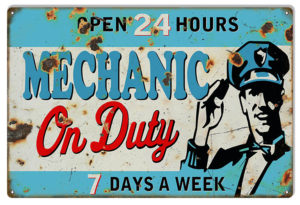 When I began to develop the aptitude to identify letters, recognize written vocabulary, and understand how a succession of words created a sentence, and thus establish thoughts and concepts, my imagination would formulate powerful ideas and images inspired by a child’s understanding behind the meaning of the written word. On the outside wall above the bay doors of our service station was a sign that made a very powerful statement: “Mechanic On Duty.” I recognized the second and third words, but the first one baffled me beyond all pondering. Later, when I asked my parents, what is a “maniac,” I don’t remember any scrunched faces or questioning how it was I came in contact with such a unique word. That would come later when I was introduced to profanity and innocently shared with them how I became acquainted with those exotic terms.
When I began to develop the aptitude to identify letters, recognize written vocabulary, and understand how a succession of words created a sentence, and thus establish thoughts and concepts, my imagination would formulate powerful ideas and images inspired by a child’s understanding behind the meaning of the written word. On the outside wall above the bay doors of our service station was a sign that made a very powerful statement: “Mechanic On Duty.” I recognized the second and third words, but the first one baffled me beyond all pondering. Later, when I asked my parents, what is a “maniac,” I don’t remember any scrunched faces or questioning how it was I came in contact with such a unique word. That would come later when I was introduced to profanity and innocently shared with them how I became acquainted with those exotic terms.

Their answer to my question was not clinical but illustrative with a reference to a story from the Bible, the source we went to for most of life’s big questions. The story was “The Gadarene Demoniac.” (My association with maniac/demoniac came naturally) For those unfamiliar with the tale, I point you to the Gospel of Mark; chapter 5:1-20. In short, a demon-possessed man lived in a cave, howled night and day, cut himself with stones, tore apart the chains and irons used to subdue him, and went by the name of “Legion,” meaning inside this poor man lodge an overcrowded, devilish household. Read Mark’s account if so inclined, but the upshot for me was that our service station had its own resident demon-possessed man.
The cacophony of sounds heard behind the closed bay doors was other-worldly: pounding hammer blows, metal wheels grating over concrete, loud gusts of pressurized air, revved engines, and over-modulated human voices. But I began to put two-and-two together when, one fateful day, the mechanical door opened on one of the service bays and standing before me was an unrecognizable life form, not the spiffy attendant with his crisp uniform and ready smile, but a creature dressed in ragged, grease-stained clothes, hair disheveled, oily streaks across his face and arms, strange tools in his hands—scabby hands with busted, swollen knuckles—and even stranger tools thrown about the floor or hanging from the walls, a liquid brown substance oozing from one side of his mouth—the side that bulged—and bloodshot eyes that bore holes straight through me. I stood in the presence of the modern-day equivalent of the Gadarene Demoniac.

The scales fell from my eyes. When we drove around the city or went on trips to my horror I saw the sign “Maniac on Duty” posted in clear view on nearly every service station we passed. It was ubiquitous. The world was filled with “The Walking Dead” before there ever was “The Walking Dead.” I refused to get out of the car when we pulled into our station or any other station if the “Maniac” sign was posted. I locked the back doors and hunched down in the floor board. If a parent did exit our car, I peeked out the window praying they would not go near the bay doors.
Gradually my rational mind began to exert itself and my left brain challenged my right brain as to why it was that nearly every service station had a resident maniac. It’s like when you begin to question how Santa Claus could get to all those homes around the world, slide up and down the chimney, deposit the exact toys requested by the inhabitants, and accomplished in twenty-four hours. The facts just didn’t add up. This is what happens when one side of the brain begins to communicate with the other. I could not resolve my maniac dilemma, so I asked my parents, “Does every service station have a maniac on duty?”
When I received the answer and was shown the two words written out, side-by-side, my world was once again secure. Though this linguistic puzzle was resolved, the misreading of signs, yea verily, misreading all things literary, continued to be a problem. It wasn’t until I was in college, and we discovered that my youngest brother was similarly cursed while he was in middle-school. The expert diagnosis was that we had dyslexia. And all this time I just thought I was “slow of tongue and speech.” What a relief, yet there was no magic pill to cure the ailment. Not a good start on my career path of becoming an actor and writer with its heavy emphasis on language, language that in my brain-to-eye connection would invert the symbols in reading, writing, and speaking. Yet somehow I made it through life even after the disgrace of quick eliminations from grade-school Spelling Bees and writing assignments returned covered in a fury of red scratching left by an aggravated teacher. While it has been a challenge to compensate for the defect, my imagination was never imprisoned by my reversals of words and jumbled sentences and upside down numbers, and to this day, I will always be grateful for the revelation of my maniac on duty.

